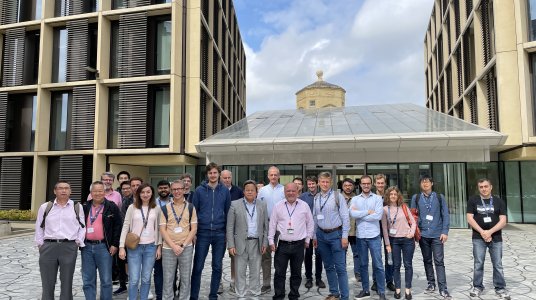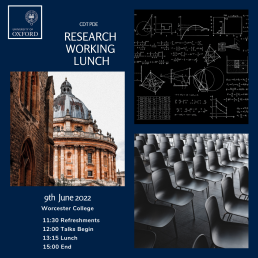PDE WORKSHOP: Stability Analysis for Nonlinear PDEs
Monday 15th August
09:30 10:30 Morning Refreshments
10:30 11:20 Session 1: Mikhail Feldman
11:30 12:20 Session 2: Cleopatra Christoforou
12:30 14:30 Lunch Break
14:30 15:20 Session 3: Jiang-Lun Wu
Tuesday 16th August
09:30 10:30 Morning Refreshments
10:30 11:20 Session 4: Jonathan Ben-Artzi
11:30 12:20 Session 5: Mikhail Perepelita
12:30 14:30 Lunch Break
14:30 15:20 Session 6: Monica Torres
Wednesday 17th August
09:30 10:30 Morning Refreshments
10:30 11:20 Session 7: Aram Karakhanyan
11:30 12:20 Session 8: Piotr Gwiazda
12:30 14:30 Lunch Break
14:30 15:20 Session 9: Cheng Yu
15:30 16:20 Session 10: Steve Shkoller (UC-Davis, USA) [online]
Thursday
09:30 10:00 Morning Refreshments
10:00 10:50 Session 11: Susana Gutierrez
11:00 11:25 Session 12: Matthew Schrecker
11:30 12:00 Morning Break (30mins)
12:00 12:25 Session 13: Timon Salar Gutleb
12:30 12:55 Session 14: Yucong Huang
13:00 14:30 Conference Lunch (90mins)
14:30 15:20 Session 15: Nicolas Dirr
15:30 16:20 Session 16: Dehua Wang (U. Pittsburgh, USA) [online]
16:30 17:00 Afternoon Break (20mins)
17:00 17:50 Session 17: Pierre-Emmanuel Jabin (Penn State, USA) [online]
18:30 21:00 Conference Dinner
Friday
09:30 10:30 Morning Refreshments
10:30 11:20 Session 18: Ewelina Zatorska
11:30 12:20 Session 19: Alexis Vasseur
12:30 12:45 Closing Remarks
13:00 ** ** Conference Lunch
Slides: Alexis Vasseur_2.pdf / Cheng Yu_1.pdf / Cleopatra Christoforou_0.pdf / Ewelina Zatorska.pdf / Jiang-Lun Wu.pdf / Jonathan Ben-Artzi.pdf / Matthew Schrecker.pdf / Mikhail Feldman.pdf / Mikhail A Perepelitsa.pdf / Monica Torres.pdf / Nicolas Dirr.pdf / Pierre-Emmanuel.pdf / Susana Gutierrez.pdf / Timon Salar Gutleb.pdf / Yucong Huang.pdf
Organisers:
Administrators:
Abstract

PDE Workshop in Stability Analysis for Nonlinear PDEs will be running Monday 15th - Friday 19th August.
Location: L3, AWB
Our goal was to bring together leading experts in the stability analysis of nonlinear partial differential equations across multi-scale applications. Some of the topics to be addressed include:
- Stability analysis of shock wave patterns of reflections/diffraction.
- Stability analysis of vortex sheets, contact discontinuities, and other characteristic discontinuities for multidimensional hyperbolic systems of conservation laws.
- Stability analysis of particle to continuum limits including the quantifying asymptotic/mean-field/large-time limits for pairwise interactions and particle limits for general interactions among multi-agent systems
- Stability analysis of asymptotic limits with emphasis on the vanishing viscosity limit of solutions from multidimensional compressible viscous to inviscid flows with large initial data.



